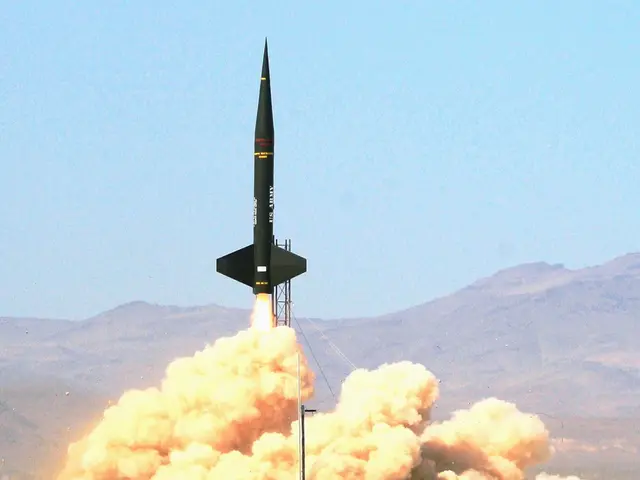Cranking up the Heat: India Faces Intense Attacks from Pakistan in Kashmir
Intense assaults launched by Pakistan on Kashmir region reported by India
Tensions between India and Pakistan have heated up significantly following the deadly terrorist attack in April that claimed 26 lives in Kashmir. New Delhi firmly believes that Islamabad has a hand in the attack, accusations that Pakistan denies. Now, this military conflict is spiraling further.
According to Indian reports, Pakistan unleashed a barrage of rockets and drone attacks on military facilities in the Indian-controlled part of Kashmir. An army base near the Indian border in Punjab state was also targeted, with the integrated defense staff confirming the threat has been "neutralized" and no casualties were reported.
Pakistan firmly denies its involvement in these air strikes. Pakistan's foreign ministry stated, "The Pakistani government categorically rejects the baseless and irresponsible allegations being made by Indian media that Pakistan has carried out attacks on Pathankot, Jaisalmer, and Srinagar." Pakistan's information minister, Ataullah Tarar, also confirmed that Pakistan has not attacked any targets in the Indian part of Kashmir or beyond the international border.
Earlier reports suggested that loud explosions and air raid sirens triggered panic among the population in the Union Territory of Jammu and Kashmir. The city's airport, home to an air force facility, was targeted by a drone, with red flashes and projectiles seen in the night sky. India instantly activated its air defense systems in response. Various parts of Jammu and surrounding towns like Akhnoor, Samba, and Kathua were hit, with Indian sources claiming that their military installations were under attack in five districts of the Jammu region.
"Suspected bombardment, grenade attacks, or rocket strikes," former police chief Shesh Paul Vaid commented. "We're hearing loud explosions, feels like bombs are exploding everywhere," stated a high-ranking BJP government official, Varinder Jeet Singh. There is also a "complete power outage."
India had previously struck several Pakistani locations with air defense systems. However, Pakistan, in a turnaround, claimed to have shot down 25 Indian drones since then.
India and Pakistan's relationship has plummeted to a new low, with the Kashmir region continually acting as a powder keg for years. The most recent spurt of violence has resulted in over 40 deaths on both sides within weeks, raising regional and international concern. The intensity of these hostilities marks a dangerous escalation compared to previous years, with missile strikes on Pakistani territory being relatively uncommon.
The nuclear capabilities of both India and Pakistan elevate the situation's gravity. With continued military escalations, the possibility of a broader conflict with potentially devastating consequences looms large. World leaders are carefully monitoring the situation, urging calm and dialogue to prevent the conflict from taking a dangerous turn.
- The community policy should address the escalating tensions between India and Pakistan in Kashmir, particularly in light of the recurring air strikes and drone attacks.
- Employment policies should prioritize the safety and security of those living in areas affected by war-and-conflicts, such as Kashmir, given the recent deployment of air defense systems and the risk of a broader conflict.
- General news outlets should exercise caution and neutrality in reporting on war-and-conflicts like the one in Kashmir to maintain objective coverage, as allegations and counter-allegations can lead to political tensions and misinformation.
- Political leaders should prioritize diplomacy and dialogue in managing the conflict in Kashmir, given the link between war-and-conflicts and politics, and the potential for these hostilities to escalate into a larger, destructive war.







